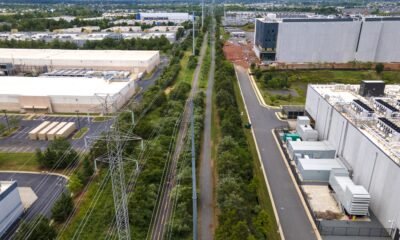Tools & Platforms
Can a $10,000 Investment in SoundHound AI Make You a Millionaire?

Key Points
SoundHound AI (NASDAQ: SOUN) has become a popular investment pick among artificial intelligence investors because it’s one of a handful of pure-play AI stocks that are performing phenomenally well. There was significant hype surrounding SoundHound AI’s stock at the end of 2024, when it peaked at around $24. The stock immediately sold off in 2025, but has steadily recovered as its financial results have started to live up to the hype that was built into the stock.
SoundHound AI is still down around 40% from its all-time high, but its business is looking stronger than ever. Given this level of success, is it possible that a modest $10,000 investment could yield $1 million? Let’s take a look.
Where to invest $1,000 right now? Our analyst team just revealed what they believe are the 10 best stocks to buy right now. Continue »
Image source: Getty Images.
SoundHound AI’s technology will become more widespread over the next few years
Using audio recognition technology with AI isn’t a new concept. Products like Siri and Alexa have been around for some time, but their performance leaves much to be desired. SoundHound AI’s products enable a more lifelike interaction between users and their AI counterparts, and also outperform humans in certain instances, such as processing a drive-thru order.
Automating drive-thrus is one popular use case for SoundHound’s technology. Another is digital assistants in vehicles. For years, these audio assistants weren’t very useful and only had a limited use case. While this technology hasn’t been rolled out in North America, regions spanning from Japan to Europe have already implemented SoundHound AI’s technology in vehicles, and we can expect to see it in the U.S. shortly.
SoundHound AI’s target markets are any interaction between two humans that an AI agent could perform. That’s a massive market opportunity, and spans from the financial to the healthcare industries. As AI technology evolves, the possibilities for SoundHound AI’s product usage are virtually limitless, which could make it a rare millionaire-maker stock.
But is that a realistic goal?
A return of 100 times is unlikely, but market-crushing returns are possible
SoundHound AI is currently valued at $6 billion. So, for it to turn $10,000 into $1 million, it would be worth $600 billion. That would value SoundHound AI about the same as Visa, which would require SoundHound AI’s technology to be used by almost every business. That’s likely a bit far-fetched, but it’s not out of the question if SoundHound’s technology has widespread use.
In its most recent quarter, SoundHound AI delivered impressive revenue growth of 217%, bringing its trailing 12-month total to $131 million. On SoundHound AI’s conference call, management claimed that it can grow organically (meaning growth without acquisitions) by 50% annually for the “foreseeable future.”
That’s a tall task, but how long would it take for SoundHound AI to achieve 100x returns at that rate? At a 50% growth rate, SoundHound AI would increase its revenue 100-fold in just over 11 years. That’s a long time to grow that fast, but with the potential market opportunity surrounding automation with AI, it’s not out of the question.
However, I still think it’s incredibly unlikely to occur. I doubt that SoundHound AI will be able to turn $10,000 into $1 million, but I think SoundHound AI may be a winning stock pick over the next decade. It’s also a risky pick, as it could be disrupted by any one of the AI hyperscalers, so investors need to keep their position sizing relatively small to account for the risk. If investors can do that, I think SoundHound AI is a smart stock pick here, especially if it can maintain its rapid growth pace for he foreseeable future, as management projects.
Should you invest $1,000 in SoundHound AI right now?
Before you buy stock in SoundHound AI, consider this:
The Motley Fool Stock Advisor analyst team just identified what they believe are the 10 best stocks for investors to buy now… and SoundHound AI wasn’t one of them. The 10 stocks that made the cut could produce monster returns in the coming years.
Consider when Netflix made this list on December 17, 2004… if you invested $1,000 at the time of our recommendation, you’d have $649,037!* Or when Nvidia made this list on April 15, 2005… if you invested $1,000 at the time of our recommendation, you’d have $1,086,028!*
Now, it’s worth noting Stock Advisor’s total average return is 1,056% — a market-crushing outperformance compared to 188% for the S&P 500. Don’t miss out on the latest top 10 list, available when you join Stock Advisor.
*Stock Advisor returns as of September 8, 2025
Keithen Drury has positions in Visa. The Motley Fool has positions in and recommends Visa. The Motley Fool has a disclosure policy.
Tools & Platforms
NVIDIA Partners with Black Tech Street to Bring AI Revolution to Tulsa, Home of $10,000 Remote Worker Grants

NVIDIA has formed a major partnership with Black Tech Street to develop Tulsa’s historic Greenwood District into a national artificial intelligence center, marking a significant economic development initiative for the area once known as Black Wall Street.
Partnership Overview and Goals
The collaboration, formalized through a Memorandum of Understanding, aims to train up to 10,000 people in AI technologies while supporting local startups and positioning Tulsa as a leader in artificial intelligence innovation. The initiative centers on creating the Greenwood AI Center of Excellence within the district that was devastated by the 1921 Tulsa Race Massacre.
“This is going to have an incredible impact on Tulsa,” said Terrance Billingsley II, CEO of Black Tech Street. “NVIDIA is the most valuable company in the world, leading the most important technological revolution in human history.”
The partnership leverages Tulsa’s recent designation as a federal Tech Hub, which awarded the city $51 million from the U.S. Economic Development Administration. Of that funding, $10.6 million will specifically support the AI center development.
Comprehensive Training and Education Program
The initiative’s training component will reach across multiple educational institutions and community organizations. Partners include Langston University, Tulsa Community College, and Oklahoma State University, creating a comprehensive educational ecosystem for AI development.
Educators will receive certification through the NVIDIA Deep Learning Institute University Ambassador Program, providing access to cloud-based tools powered by NVIDIA GPUs. This infrastructure aims to ensure high-quality, standardized training across participating institutions.
The 10,000-person training target represents an ambitious scale that could significantly impact Tulsa’s workforce development. The program plans to serve students, workers, and entrepreneurs throughout the region, creating multiple pathways for AI skill development.
Economic Development and Startup Support
Beyond education, the partnership includes substantial business development components. NVIDIA will provide local startups access to its Inception program, which offers early-stage companies technology support and networking opportunities crucial for growth in competitive tech markets.
The collaboration also includes access to advanced computing resources, including GPUs and cloud platforms essential for AI development projects. These resources typically require significant capital investment, making the partnership valuable for local entrepreneurs and researchers.
Billingsley emphasized the local economic focus: “The next step is getting NVIDIA integrated into the community, getting certain programs up and running for people to take advantage of, hosting different events, and trying to architect what the big play that is going to transform our local economy is going to be.”
Strategic Location and Historical Significance
The choice of Greenwood District for this initiative carries particular historical weight. The area was once known as Black Wall Street, representing one of the most prosperous Black communities in early 20th-century America before its destruction in the 1921 Tulsa Race Massacre.
This partnership positions AI development within a community that has symbolic importance for Black economic empowerment and entrepreneurship. The initiative aims to create high-paying tech jobs and drive entrepreneurship in an area working to rebuild its economic foundation.
Political and Community Support
The partnership has garnered support from political leaders across party lines. U.S. Senator James Lankford highlighted Oklahoma’s growing technology profile: “Oklahoma is fast becoming a national leader in next-generation innovation, from AI to aerospace and beyond. Whether it is in Tulsa or across the state, Oklahoma is proving that you do not have to be on the coasts to be on the cutting edge.”
Tulsa Mayor Monroe Nichols expressed enthusiasm for the economic opportunities: “NVIDIA and Black Tech Street are setting the stage for new jobs for Tulsans, and I am eager to see how this investment in innovation will open more doors of opportunity for our community.”
Building on Tulsa’s Remote Work Success
This AI initiative builds upon Tulsa’s proven track record in attracting talent through innovative programs. The city’s Tulsa Remote program, which offers $10,000 grants to remote workers who relocate to the city, has successfully attracted approximately 3,500 participants since 2018.
Recent economic analysis found that Tulsa Remote generates more than $4 in community benefits for every $1 spent, demonstrating the city’s ability to create successful workforce attraction programs. Participants have collectively generated $622 million in direct employment income, with 70% remaining in the city after completing the program.
Industry Partnership Framework
Louis Stewart, NVIDIA’s head of ecosystem development, emphasized the collaborative approach: “Our collaboration with Black Tech Street and the larger Tulsa ecosystem is helping prepare and equip all segments of the workforce to operate and sustain transformative technology that is building America’s future.”
The partnership extends beyond NVIDIA and Black Tech Street to include Tulsa Innovation Labs, Microsoft, Langston University, and the Tulsa Economic Development Corporation. This multi-stakeholder approach aims to create a comprehensive support system for AI development and adoption.
Future Expansion Potential
The agreement establishes a foundation for potential expansion across Oklahoma, suggesting the initiative could serve as a model for other communities seeking to develop AI capabilities. The collaborative framework developed in Tulsa could be replicated in other regions working to participate in the artificial intelligence economy.
The partnership represents a significant investment in both Tulsa’s economic future and the broader democratization of AI education and development opportunities beyond traditional tech centers.
Tools & Platforms
5-Week AI Mentorship for Startups in SF

OpenAI has unveiled a new initiative aimed at nurturing the next generation of artificial intelligence innovators, marking a strategic push into talent development amid intensifying competition in the AI sector. The program, dubbed OpenAI Grove, targets early-stage entrepreneurs who are either pre-idea or in the nascent phases of building AI-focused companies. According to details shared in a recent announcement, the five-week mentorship scheme will be hosted at OpenAI’s San Francisco headquarters, providing participants with hands-on guidance from industry experts and access to cutting-edge tools.
The program’s structure emphasizes practical support, including technical assistance, community building, and early exposure to unreleased OpenAI models. As reported by The Indian Express, participants will have opportunities to interact with new AI tools before their public release, fostering an environment where budding founders can experiment and iterate rapidly. This comes at a time when AI startups are proliferating, with OpenAI positioning itself as a hub for innovation rather than just a technology provider.
A Strategic Move in AI Talent Cultivation OpenAI’s launch of Grove reflects a broader effort to secure its influence in the rapidly evolving AI ecosystem, where retaining and attracting top talent is crucial. By offering mentorship to pre-seed founders, the company aims to create a pipeline of AI-driven ventures that could potentially integrate with or complement its own technologies. Recent posts on X highlight enthusiasm from the tech community, with users noting the program’s potential to accelerate startup growth through exclusive access to OpenAI’s resources.
Industry observers see this as OpenAI’s response to competitors like Anthropic and Grok, which have also been aggressive in talent acquisition. The first cohort, limited to about 15 participants, is set to run from October 20 to November 21, 2025, with applications closing on September 24. As detailed in coverage from CNBC, the initiative includes in-person sessions focused on co-building prototypes with OpenAI researchers, underscoring a hands-on approach that differentiates it from traditional accelerator programs.
Benefits and Broader Implications for Startups Participants in Grove stand to gain more than just technical know-how; the program promises a robust network of peers and mentors, which could be invaluable for fundraising and scaling. Early access to unreleased models, as mentioned in reports from NewsBytes, allows founders to test ideas with state-of-the-art AI capabilities, potentially giving them a competitive edge in a market where speed to innovation is key.
This mentorship model aligns with OpenAI’s history of fostering external ecosystems, similar to its past investments in startups through funds like the OpenAI Startup Fund. However, Grove appears more focused on individual founders, particularly those without formal teams or funding, addressing a gap in the startup support system. Insights from The Daily Jagran emphasize how the program could help participants raise capital or refine their business models, drawing on expert guidance to navigate challenges like ethical AI development and market fit.
Challenges and Future Outlook While the program has generated buzz, questions remain about its scalability and inclusivity. With only 15 spots in the initial cohort, selection will be highly competitive, potentially favoring founders with existing connections in the tech world. Recent news on X suggests mixed sentiments, with some praising the initiative for democratizing AI access, while others worry it might reinforce Silicon Valley’s dominance in the field.
Looking ahead, OpenAI plans to run Grove multiple times a year, potentially expanding its reach globally. As covered in TechStory, this could evolve into a cornerstone of OpenAI’s strategy to build a supportive community around its technologies, much like how Y Combinator has shaped the broader startup world. For industry insiders, Grove represents not just a mentorship opportunity but a signal of OpenAI’s commitment to shaping the future of AI entrepreneurship, ensuring that innovative ideas flourish under its umbrella.
Potential Impact on the AI Innovation Ecosystem The introduction of Grove could catalyze a wave of AI startups, particularly in areas like generative models and ethical AI applications, by providing resources that lower barriers to entry. Founders selected for the program will benefit from personalized feedback loops, helping them avoid common pitfalls in AI development such as data biases or scalability issues.
Moreover, this initiative underscores OpenAI’s evolution from a research lab to a multifaceted player in the tech industry. By mentoring early-stage talent, the company may indirectly fuel advancements that enhance its own ecosystem, creating a virtuous cycle of innovation. As the AI sector continues to mature, programs like Grove could play a pivotal role in distributing expertise more evenly, empowering a diverse array of entrepreneurs to contribute to technological progress.
Tools & Platforms
San Antonio Spa Unveils First AI-Powered Robot Massager

In the heart of San Antonio, a quiet revolution in wellness technology is unfolding at Float Wellness Spa on Fredericksburg Road. The spa has become the first in the city to introduce the Aescape AI-powered robot massager, a device that promises to blend cutting-edge artificial intelligence with the ancient art of massage therapy. Customers lie face-down on a specialized table, where robotic arms equipped with sensors scan their bodies to deliver personalized treatments, adjusting pressure and techniques in real time based on individual anatomy and preferences.
This innovation arrives amid a broader surge in AI applications within the health and wellness sector, where automation is increasingly tackling labor shortages and consistency issues in human-delivered services. According to a recent feature by Texas Public Radio, the Aescape system at Float Wellness Spa uses advanced algorithms to map muscle tension and provide targeted relief, marking a significant step for Texas in adopting such tech.
Technological Backbone and Operational Mechanics
At its core, the Aescape robot employs a combination of 3D body scanning, machine learning, and haptic feedback to simulate professional massage techniques. Users select from various programs via a touchscreen interface, and the system adapts on the fly, much like a therapist responding to subtle cues. This isn’t mere gimmickry; it’s backed by years of development, with the company raising substantial funds to refine its precision.
In a March 2025 report from Bloomberg, Aescape secured $83 million in funding from investors including Valor Equity Partners and NBA star Kevin Love, underscoring investor confidence in robotic wellness solutions. The technology draws from earlier prototypes showcased at events like CES 2024, where similar AI-driven massage robots demonstrated personalized adaptations to user needs.
Market Expansion and Local Adoption in San Antonio
The rollout in San Antonio follows successful debuts in cities like Los Angeles, as detailed in a December 2024 piece by the Los Angeles Times, which described the experience as precise yet impersonal. At Float Wellness Spa, appointments are now bookable, with sessions priced competitively to attract a mix of tech enthusiasts and those seeking convenient relief from daily stresses.
Posts on X, formerly Twitter, reflect growing public intrigue, with users like tech influencer Mario Nawfal highlighting the robot’s eight axes of motion for deep-tissue work without the awkwardness of human interaction. This sentiment aligns with San Antonio’s burgeoning tech scene, where AI innovations are intersecting with local industries, as noted in recent updates from the San Antonio Express-News.
User Experiences and Industry Implications
Early adopters in San Antonio report a mix of awe and adjustment. One reviewer in a Popular Science article from March 2024 praised the Aescape for its customized convenience, likening it to “the world’s most advanced massage” powered by AI that learns from each session. However, some note the absence of human warmth, a point echoed in an Audacy video report from August 2025, which captured the robot’s debut turning heads in the city.
For industry insiders, this represents a pivot toward scalable wellness tech. With labor costs rising and therapist shortages persistent, robots like Aescape could redefine spa economics, potentially expanding to chains like Equinox. Yet, challenges remain, including regulatory hurdles for AI in healthcare-adjacent fields and ensuring data privacy for body scans.
Future Prospects and Competitive Dynamics
Looking ahead, Aescape’s expansion signals broader trends in robotic automation. A Yahoo Finance piece from August 2025 introduced a competing system, RoboSculptor, which also leverages AI for massage, hinting at an emerging market rivalry. In San Antonio, this could spur further innovation, with local startups like those covered in Nucamp’s tech news roundup exploring AI tools in customer service and beyond.
As AI integrates deeper into personal care, ethical questions arise—will robots supplant human jobs, or augment them? For now, Float Wellness Spa’s offering provides a tangible glimpse into this future, blending Silicon Valley ingenuity with Texas hospitality. Industry watchers will be keen to monitor adoption rates, as success here could accelerate nationwide rollout, transforming how we unwind in an increasingly automated world.
-

 Business2 weeks ago
Business2 weeks agoThe Guardian view on Trump and the Fed: independence is no substitute for accountability | Editorial
-
Tools & Platforms1 month ago
Building Trust in Military AI Starts with Opening the Black Box – War on the Rocks
-

 Ethics & Policy2 months ago
Ethics & Policy2 months agoSDAIA Supports Saudi Arabia’s Leadership in Shaping Global AI Ethics, Policy, and Research – وكالة الأنباء السعودية
-

 Events & Conferences4 months ago
Events & Conferences4 months agoJourney to 1000 models: Scaling Instagram’s recommendation system
-

 Jobs & Careers2 months ago
Jobs & Careers2 months agoMumbai-based Perplexity Alternative Has 60k+ Users Without Funding
-

 Podcasts & Talks2 months ago
Podcasts & Talks2 months agoHappy 4th of July! 🎆 Made with Veo 3 in Gemini
-

 Education2 months ago
Education2 months agoMacron says UK and France have duty to tackle illegal migration ‘with humanity, solidarity and firmness’ – UK politics live | Politics
-

 Education2 months ago
Education2 months agoVEX Robotics launches AI-powered classroom robotics system
-

 Podcasts & Talks2 months ago
Podcasts & Talks2 months agoOpenAI 🤝 @teamganassi
-

 Funding & Business3 months ago
Funding & Business3 months agoKayak and Expedia race to build AI travel agents that turn social posts into itineraries

















